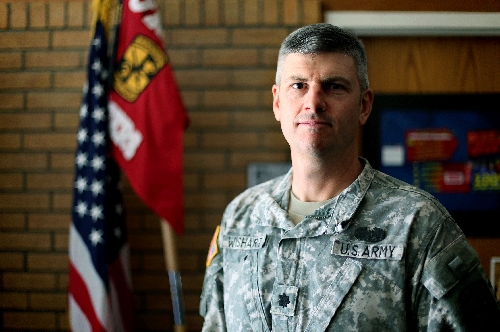When troops get orders to move, some risk losing houses



These soldiers and airmen have dropped bombs or have seen them explode in Iraq and Afghanistan, so they know firsthand the stress of fighting the nation’s wars.
Now they are battling a different kind of stress at home in the Las Vegas Valley — the chronic stress that weighs on them from being at ground zero of the mortgage crisis.
When they get orders to move somewhere else, they have no choice but to go. In many cases, they face six-figure losses on their homes through short sales or foreclosure.
They also risk losing their security clearances, which could prevent them from flying warplanes and leading troops after they arrive at their new assignments.
"This has been more stressful than my deployment," said Lt. Col. Eric Wishart, who is trying to sell a home worth 60 percent less than he paid for it. "And going to Afghanistan is no picnic."
Wishart is not alone.
More than a thousand airmen at Nellis Air Force Base have been trapped in the mortgage crisis and are unable to refinance, according to a survey by Rep. Joe Heck, R-Nev.
The survey found 740 airmen upside down on their mortgages don’t qualify for the Pentagon aid program, another 263 can’t sell their homes at a break-even price and some are renting them at a monthly loss.
Of the base’s 8,932 personnel, 32 are in foreclosure and 98 have completed short sales or are in the process of completing one.
After seeing this snapshot of what is happening at Nellis, Heck proposed an amendment to a defense bill to shed more light on the problem.
While the bill doesn’t provide funding for an assistance program, it would study the problem nationwide across all branches of the services.
"Service members become distracted by personal and financial issues, rather than focusing on their mission," Heck said earlier this month , noting that a soldier’s ruined credit makes it difficult for them to maintain their security clearances.
ONE SOLDIER’S STORY
Wishart, a full-time Nevada National Guard soldier and military science professor who chairs the Army ROTC program at the University of Nevada, Las Vegas, is trying to pay off a 1,550-square-foot house in northwest Las Vegas, where he lives with his wife and two daughters.
They bought the house in 2006 for $327,000, but it is only worth $132,000 based upon its current appraisal and a cash offer in a short sale.
His permanent-change-of-station, or PCS, orders will soon send him to Carson City to work as a battalion commander at Guard headquarters.
He might have been able to avoid a loss through the Defense Department’s Homeowners’ Assistance Program, but he isn’t eligible even though it was expanded in the 2009 economic stimulus bill.
The assistance program through the Army Corps of Engineers is limited to personnel who bought their homes before July 1, 2006, but who sold them because of permanent relocations between Feb. 1, 2006, and Sept. 30.
"What I’m asking for is some protection from deficiency judgments," said Wishart, who served as a combat adviser in Afghanistan during a year’s tour that ended in 2009.
"Thank God, no one on our team was killed or injured, but we saw our share of rockets and IEDs," he said, referring to improvised explosive devices, or roadside bombs.
‘UPSIDE DOWN A BUNCH’
Three pilots who fly fighter jets at Nellis Air Force Base told similar tales after being reassigned out of state.
Lt. Col. Mike Ballek, an F-15 pilot, said he, too, has been enduring financial stress since he learned in October that he would be moving his wife and son to Washington, D.C., this summer.
They bought a new two-story home in June 2007 in a gated North Las Vegas community. The value of the 2,800-square-foot home is "upside down a bunch, over $200,000," he said Friday.
Like Wishart, he isn’t eligible for assistance under the Defense Department program and is losing money every month.
"What people would like to see is maybe expand the window or get rid of the eligibility date. Let people apply and let the folks who run the program make the decision on who’s deserving," said Ballek, who, like the other pilots, spoke as a private citizen and not on behalf of the armed forces.
Stress from the mortgage crisis centers on that nagging thought "that potentially all your life savings could be gone. There are a lot of unknowns," Ballek said.
"It’s a different kind of stress but still stressful," he said. "In combat your primary concern is not getting shot or making sure that you bomb the right target not the wrong target. This is a different kind of stress, the kind that weighs on you over time … knowing that you have to figure out how to get out from under the house and what’s going to happen in terms of security clearances."
‘DO THE BEST FOR MY FAMILY’
Marine Corps Lt. Col. David Berke flies F-22 Raptor jets out of Nellis under a pilot exchange program with the Air Force. He moved here in 2008 and bought a home in North Las Vegas with his wife to start their family. They now have a 2-year-old daughter and a newborn.
"I don’t have a waterfall and a helicopter pad, just a reasonably priced home in a reasonable neighborhood. The goal was not being greedy or lavish but to do the best for my family."
With orders to relocate next month to Eglin Air Force Base, Fla., to fly the new F-35 joint strike fighter jets, Berke said he will have to find a place to rent there while continuing to make payments on his North Las Vegas home that he bought for about $250,000 but is now worth approximately $120,000.
He expects to lose between $125,000 and $150,000 on his investment, which has brought on "a significant amount of personal stress."
"It undermines the barrier between your professional life and personal life," said Berke, who has been a Marine pilot for 17 years with multiple deployments to Iraq and Afghanistan.
Berke said when he bought the house in 2008 he thought the home market had hit bottom and the market would return. Now he thinks "there’s a distinct possibility that home values will decrease in the future."
LOSING SECURITY CLEARANCE
Air Force Lt. Col. Zac Wood closed on his North Las Vegas house in 2009 thinking the market would recover in the three or four years he would be stationed at Nellis flying F-16s.
"I really never thought I’d find myself in this situation," Wood said.
He and his wife have three children.
"We have it on the market and we’re trying to hold on to it and sell for at least what we owe the bank."
While he is not as upside down on his North Las Vegas home as some of the other pilots, his situation is compounded by having his savings tied up in a previous residence in Newport News, Va., that he must rent out at a loss.
He also is worried about losing his security clearance after he moves to his new assignment in Fort Drum, N.Y., his 11th move in 17 years.
"Up until last year my understanding was you could let security know you might have to file bankruptcy and go into foreclosure, and they would kind of understand that. But in the last six months to nine months or so, they’ve come about and said they’re not going to be quite so understanding," he said.
"So I could lose my security clearance. And if I lose my security clearance, I’m kind of useless to the Air Force. Pretty much every job that I could do requires a security clearance."
Wood, an Iraq War veteran, said he loses sleep trying to grapple with the mortgage crisis.
"It’s a horribly stressful situation," he said, adding that he tries to find peace of mind through running. "I ran six miles today to get rid of it."
In interviews last week, the three pilots emphasized that they need to protect the integrity of their security clearances. They said they also risk depleting their savings to stay afloat while they try to sell their homes at a loss, or rent them out with a negative cash flow. Additionally, they will be strapped to buy or rent at their new locations that, like Nellis, have either no or limited on-base housing.
THROUGH AN AGENT’S EYES
Real estate agent Aldo Martinez, who retired from the military in 2005, is handling the Wishart family’s short sale and has worked with many active duty soldiers and airmen in the Las Vegas area.
He said Congress needs legislation to help what he called "the most underpaid profession in the United States for the amount of sacrifices."
He said even USAA, a lender that "is supposed to be a service member organization," has been no help in resolving the Wisharts’ case. He charged the USAA with intentionally interfering with a contract to sell the property.
"It’s like lose-lose instead of creating a win-win," Martinez said, describing "the humiliation a person goes through losing their home."
Nicole Alley, a corporate spokeswoman for USAA in San Antonio, said Friday that she didn’t have all the details to comment on the Wisharts’ case.
Nevertheless, she said, "We’re dedicated to those serving the nation and we are sensitive to members having financial hardships in today’s economy. That’s why USAA goes above the Service Members Relief Act. We go above those requirements on many products including credit cards, personal loans, auto loans and home equity."
Stephens Washington Bureau Chief Steve Tetreault contributed to this report. Contact reporter Keith Rogers at krogers @reviewjournal.com or 702-383-0308.












